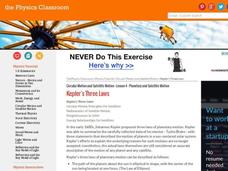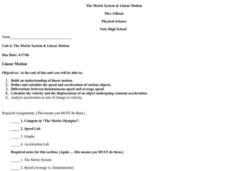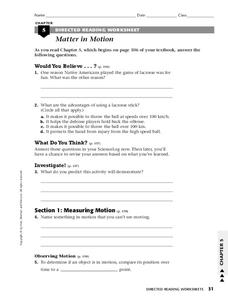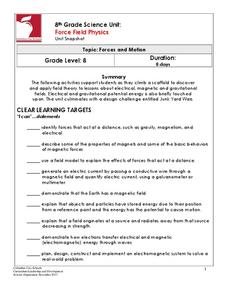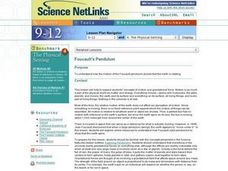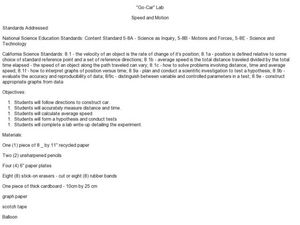Curated OER
Matter In Motion
In this science worksheet, students find the definitions to basic terms related to beginning the study of physics and then complete the riddles on page 2.
It's About Time
A Moving Frame of Reference
We often remind pupils to cite their references, but this lesson helps them understand there are many frames of reference. Scholars experiment with throwing a ball straight up in the air and catching it. Then they must do it again while...
Curated OER
Newton's Laws of Motion
Ninth graders utilize Newton's Laws of Motion to explain how things move, create poster illustrating each law of motion, and present and explain their poster to classmates.
Columbus City Schools
It’s All Relative
Are the people on the other side of the world standing upside down? Pupils discuss the relationship between movement and position words. The unit explores the concept of reference points through animation, modeling, photography, and more.
Physics Classroom
Kelper's Three Laws
A flipped classroom lesson introduces astrophysics fanatics to Kepler's three laws of planetary motion. After reading about the laws of ellipses, equal areas, and harmonies, and also learning how Newton's gravitation concepts come into...
Curated OER
Graphing Your Motion with Vernier LabQuests
Seventh graders create motion graphs using a motion sensor. In this physics lesson, 7th graders match the graph shown by moving their body. They relate the slope to the way they moved.
Curated OER
The Ant and The Turntable-Frames of Reference
In this frames of reference worksheet, students solve 5 problems given the details of a journey an ant takes from the center of a CD ROM to its edge. Students draw a scaled sketch of the turntable showing the motion of the ant from...
Curated OER
Linear Motion
Students are able to build an understanding of linear motion. They are able to define and calculate the speed and acceleration of various objects. Students are able to differentiate betweeen instantaneous speed and average speed. They...
Curated OER
Matter in Motion
For this matter in motion worksheet, students answer the provided questions as it relates to motion, speed, velocity, and acceleration. Students mark given statements as either true or false.
Curated OER
Velocity and Acceleration
Compliment your physics lesson with this PowerPoint which demonstrates many important points regarding acceleration and velocity. A starter experiment activity to stimulate student thinking is given, and may prove very interesting to a...
Curated OER
Describing the Motion of a Battery Powered Cars
Students explore distance a toy car travels by changing the amount of batteries used to power the toy car. In this force and motion lesson, students calculate the average speed of a car while investigating the power from various amounts...
UAF Geophysical Institute
Carbon Footprint
Your young environmentalists can calculate their carbon footprint and discuss ways to reduce it with a worksheet about climate change. After reading a handout about what impact one's carbon footprint can have on the environment, kids...
Columbus City Schools
Force Field Physics
Attracted class members to an activity-packed journey through the science behind the invisible forces at work all around us. From jump rope generators to junkyard wars, there's never a dull moment when eighth grade physics scholars...
Curated OER
Foucault's Pendulum
Students investigate how the motion of the Foucault pendulum proves that the Earth is rotating. They research the Internet about pendulums and conduct an experiment online. They view a multimedia presentation about pendulums and read...
Curated OER
Pendulum Motion
Students explore questions which cannot be handled with simple pendulums, and examine both the usefulness and the limitations of approximations in science. A Java applet created from a Stella model is included.
Curated OER
Retrograde Motion
Students study the motions of the heavenly bodies. In this space lesson plan students use models to show a variety of schemes explaining the motions.
Curated OER
Using A Video Camera In the Physics Classroom
Students use video cameras as a way to analyze and understand motion. In this motion lesson students complete an activity that helps them better understand motion and calculate time.
Weebly
Definitions of Conduction, Convection, and Radiation
There's quite a bit in this physical science packet. First, how is heat transferred? Learners read a brief explanation of conduction, convection, and radiation before identifying common occurrences (with pictures) as one of the three....
Curated OER
The Great Tin Race
Young scholars construct and race tin can cars. In this motion lesson plan, groups build tin racers, complete timed runs, and record their data on the provided worksheet. The teacher leads a discussion comparing data between groups....
Curated OER
Rocketry
Students design and construct a paper rocket that can be launched with a drinking straw. They participate in a lecture and read an article about rocketry and how Newton's Third Law applies to rocket launches. Each student constructs...
Curated OER
In Golf Gravitas
Students are introduced to potential and kinetic energy through the example of a ball being thrown straight up in the air. They are then told that the energy associated with the position of the object is referred to as potential energy....
Curated OER
Stars and Galaxies
Eighth graders define constellations and how they are used as reference points and identify stars and constellations in the nighttime sky. They construct their own planetarium star finder and identify the location of circumpolar, zodiac,...
Laboratory for Atmospheric and Space Physics
The Planets and Scale
Scholars gain an insight into the relative size of planets and distance between inner and outer planets with the help of informational text, a data table, and a series of four questions.
Curated OER
"Go-Car" Lab
Young scholars construct a car based on directions given. In this physics lesson, students calculate average speed using distance and time information. They collect data and create a graph of distance vs. time.






